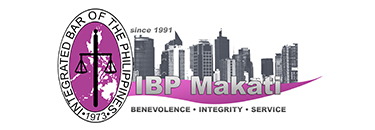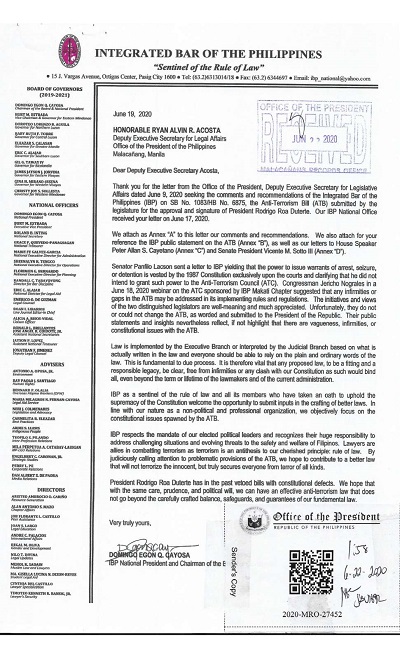1. Section 29 of the ATB which reads: “any law enforcement agent or military personnel who,
having been duly authorized in writing by the ATC, has taken custody of a person suspected of
committing any of the act defined and penalized under Sections 4-12”… of the ATB shall not be
liable if he or she detains the suspect for a period of 14-24 days without filing a judicial charge,
is unconstitutional insofar as it gives the Anti-Terrorism Council (ATC), an agency under the
Executive Branch of government, the power to issue written authorization to arrest and detain.
Under Section 2, Article II of the 1987 Constitution, in keeping with the carefully crafted
checks and balance, only judges can issue warrants of arrest.
The language of the bill is plain and clear. This is specially so if taken in context with the power
of the ATC to “designate” a person or organization, even ex parte, upon mere probable cause,
as a terrorist and to get the Anti Money Laundering Council to freeze the assets or funds of the
suspects so designated.
Section 29 could not refer to allowable warrantless arrest under Rule 113 of the Rules of Court
because anyone can actually effect a warrantless arrest under Rule 113 without any need for
any written authority from anyone. Superfluity cannot be read into a clear provision of law.
Section 29 cannot also be interpreted to be senseless as to require the law enforcer to first
secure a written authority from the ATC (composed of nine Cabinet Secretaries and the
Executive Director of the AMLC, all based in Manila) before he effects a warrantless arrest
under Rule 113 where time is of the essence: the crime is being committed in his presence, is
about to be committed, or has just been committed and the arresting person has personal
knowledge of such.
The public pronouncements of the principal author of the Senate Bill clarifying that the ATC
should not have the power to issue warrants of arrest or detention inasmuch as this is strictly a
judicial function under the 1987 Constitution should be a compelling reason to correct the
wording of Section 29 to clearly reflect the true intent of the legislature and to avoid
misapplication of the law.
2. Section 29 is unconstitutional because it does not prescribe the process or the standards by
which the ATC will issue the written authority to detain for 14-24 days. Under the 1987
Constitution, the judge will issue a warrant of arrest only upon “probable cause”, that is, he has
reasonable grounds to believe, based on the evidence presented before him, that 1) a crime
has been committed; and 2) the person to be arrested probably committed the crime. Section
29 does not require “probable cause” for the ATC to issue a the written authority to detain. The
Senate records show that the principal author of the Bill argued for an “inchoate offense” and
said: “hindi pa nangyayari, nasa simula pa lamang, pwede na nating arestuhin because we
want to be proactive because this is a new phenomenon”. Authorizing an arrest before the
crime is committed blatantly disregards the due process clause of the Constitution and the so
many Supreme Court decisions defining “probable cause” for authorized arrest.
3. Section 18, Article VII of the Constitution allows only three days detention without charging
the suspect in court even in the extreme and critical situation of invasion or rebellion, the
privilege of the writ of habeas corpus is suspended, and the existence of the Republic is
imperiled. The ATC allows 14-24 days of detention without any charge filed in court.
By logic, in context, and with due regard to the records of the proceedings of the 1987
Constitutional Commission, Section 18, Article VII of the Constitution sets a 3-day maximum
limit for detentions without judicial charge for all kinds of crimes and under all circumstances.
If, even in exceptional circumstances, a 3-day limit is set by the Constitution, with more reason
should the limit be maintained in cases of terrorism or any other crime under ordinary
circumstances. It is worth noting that in passing the Human Security Act, the earlier Congress
kept the detention without judicial charge to a maximum of three days, as prescribed by the
1987 Constitution.
ANNEX “A”
That other countries have comparatively longer periods of detention of suspected terrorists is a
fact. However, it does not necessarily follow that the Philippines should go their way. The
constitutions of these countries do not set limits to detentions without judicial charge or as
much principles and jurisprudence on due process. They do not have comparable issues of
abuse, trust, and accountability in governance.
The fact that the ATB compels the arresting officer to “immediately inform” the judge of the
nearest court, the Commission on Human Rights (CHR), the IBP Legal Aid Committee, or the
Public Attorneys Office (in case they need free legal aid) upon arresting a suspected terrorist is
cold comfort for the detainee since the court cannot do much unless a charge if filed before it.
Besides, the detaining officer can always invoke the questionable Section 29 of the ATB.
4. Section 25 of the ATC, particularly the third and fourth paragraphs thereof which give the
ATC the power to “designate” a suspected terrorist, ex parte, upon mere probable cause and
freeze the assets of the suspect ex parte through the Anti-Money Laundering Council (AMLC),
(Section 36, ATB), are constitutionally questionable. Freezing assets is deprivation of property
which cannot be done without due process. It is significant that proscription proceedings
before the Court of Appeals give the suspects a chance to be heard. In contrast, designation
proceedings of the ATC and the AMLCare are ex parte and without any procedural safeguards
or substantial standards. The zeal or the need for quick decisions can be sufficiently addressed
by setting time limits for the Court of Appeals to decide. There is no need to upset the
constitutional safeguards of due process or grant an executive agency excessive powers not
allowed by the Constitution.
5. Paragraphs (a), (b), (c) of Section 4 of the ATB that define “any act”….. intented to cause…”
as a crime do not meet constitutional standards. They are vague and over broad. They punish
mere intent that normally cannot be divined. They are susceptible to abuse by a law enforcer
who could arrest those legitimately exercising their constitutional rights or upgrade an ordinary
crime to terrorism by merely alluding the prohibited “intent” to his targets and detain them for
a period of 14-24 days without any judicial charge.
6. Section 34 of the ATB which provides: “…In cases where evidence of guilt is not strong, and
the person charged is entitled to bail and is granted the same, the court, upon application of
the prosecutor shall limit the right of travel of the accused… he or she may also be placed under
house arrest…” and be incommunicado, renders nugatory the constitutional rights to be
presumed innocent and to post bail.
7. ATB seems to allow guilt by association, a principle that is rejected in constitutional and
criminal law principles. Punishing indirect incitement may be considered unwarranted prior
restraint to freedom of expression.
8. Retaining the functions of the Commission on Human Rights found in the Human Security
Act will not diminish the efficacy of the Bill. It would be reassuring to many.
9. We note the recognition given by the legislature to the free legal aid program of the
Integrated Bar of the Philippines (IBP) by tasking IBP to assist arrested terrorists, if necessary.
Terrorists are not the target clientele of the IBP legal aid program. Be assured though that IBP
does not shirk from the responsibility of helping those truly in need and who meet the merit
and fitness test of the IBP so that justice may not be delayed or denied due to the absence of a
lawyer. We could have suggested more workable arrangements had IBP been invited to the
relevant hearings on the Anti-Terrorism Bill.

